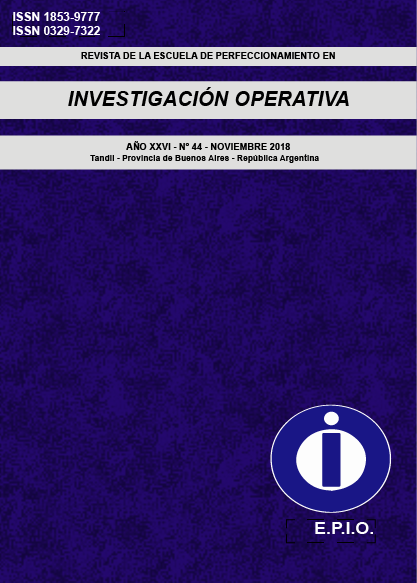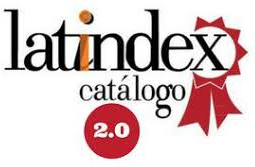game theory in the field of energy efficiency: analysis of the industrial dynamicas in the search of an effective Nash Equilibrium
Keywords:
game theory, Prisoner´s Dilemma, program of energy efficiency, system of incentives, sustainable economic developmentAbstract
This research describes “The Game of Energy Efficiency”. Here, it is analyzed the importance of the system of incentives suggested by the State and the conditions of the markets to encourage investment decisions in two industrial areas that produce complementary goods.
This kind of games allows to analyze the industrial dynamics in the process of searching an effective Nash Equilibrium; determining the differences that exist as to an optimal situation in energy, economic and environmental matters.
From this perspective, the role of the State is essential to achieve significant levels of energy and economic savings and a reduction of greenhouse gases (GHG); as well as to increase the grade of industry competitiveness and the general economy efficiency.
In this sense, the Game of Energy Efficiency along with Artificial Intelligence (Machine Learning) allows to develop a proactive approach in the field of public policies, establishing alerts as for the design, application and control of highly effective systems of incentives in order to modify the behavior patterns of economic markets leading them to the paths of Sustainable Economic Development.
Downloads
References
BINMORE, K. (2011): “LA TEORIA DE JUEGOS. UNA BREVE INTRODUCCION”. Alianza Editorial S.A., Madrid, 2011.
BOUILLE, D. (1999): “LINEAMIENTOS PARA LA REGULACION DEL USO EFICIENTE DE LA ENERGIA EN ARGENTINA”. Serie Medio Ambiente y Desarrollo N° 16, Proyecto CEPAL/COMISIÓN EUROPEA “Promoción del Uso Eficiente de la Energía en América Latina”. Comisión Económica para América Latina y el Caribe (CEPAL), Santiago de Chile, 1999.
BOUR, E. A. (2009): “METODOS ECONOMICOS, DERECHO Y ECONOMIA”. XLIV Reunión Anual, anales de la Asociación Argentina de Economía Política, Noviembre de 2009.
CAMARDA, M. (2017): “EFICIENCIA ENERGETICA Y COMPETITIVIDAD INDUSTRIAL: ANALISIS DEL SISTEMA DE INCENTIVOS EN TORNO AL PROGRAMA PROVINCIAL ENERGIA EFICIENTE (ProPEE)”. Revista Administración Pública y Sociedad, N° 3, Junio de 2017, Instituto de Investigación y Formación en Administración Pública (IIFAP), Facultad de Ciencias Sociales de la Universidad Nacional de Córdoba.
CARPIO, C. y COVIELLO, M. (2014): “EFICIENCIA ENERGETICA EN AMERICA LATINA Y EL CARIBE: AVANCES Y DESAFIOS DEL ULTIMO QUINQUENIO”. Comisión Económica para América Latina y el Caribe (CEPAL), Santiago de Chile.
COMELLAS, E. y BUCCHERI, M. (2010): “RACIONALIDAD, INCENTIVOS, CONFLICTOS Y JUEGOS: NUEVAS AREAS DE LA ECONOMIA APLICADAS A LA GIRH”. Instituto Nacional del Agua - Centro de Economía, Legislación y Administración del Agua (INA - CELA).
CONSEJO MUNDIAL DE LA ENERGIA (2010): “EFICIENCIA ENERGETICA: UNA RECETA PARA EL ÉXITO - RESUMEN EJECUTIVO - POR UNA ENERGIA SUSTENTABLE”. Traducido por el Comité Argentino y el Grupo de Eficiencia Energética del CACME.
DEL ROSSO, A. y GHIA, A. (2012): “EFECTOS DE LA INTERRUPCION DEL SUMINISTRO ELECTRICO Y ADAPTACION DE LOS SISTEMAS ELECTRICOS A EVENTOS EXTREMOS”. Área de Pensamiento Estratégico, Cámara Argentina de la Construcción, Octubre de 2012.
FERNANDEZ, M. A.; FERNANDEZ, Y. y OLMEDILLAS, B. (2011a): “EL FRACASO DE COPENHAGUE DESDE LA TEORIA DE JUEGOS”. Documento de Trabajo de Editorial Funcas N° 585.
FERNANDEZ, M. A.; FERNANDEZ, Y. y OLMEDILLAS, B. (2011b): “LAS DIFICULTADES DE LOS ACUERDOS MEDIOAMBIENTALES DESDE LA TEORIA DE JUEGOS”. Revista de Responsabilidad Social de la Empresa N° 8 (vol. 3 N°2), pp. N° 37 a N° 60, Mayo - Agosto de 2011.
GOMEZ G.; MATHE L.; SELLA PIEDRABUENA L. (2013): Capítulo: “EFICIENCIA ENERGETICA”. Matriz de recursos energéticos de la Provincia de Córdoba, CIECS (CONICET y UNC), Editorial Copiar, Editor: Devalis Sergio A., pp. N° 95 a N° 129.
KRAUSE, M. (1999): “LA TEORIA DE JUEGOS Y EL ORIGEN DE LAS INSTITUCIONES”. Revista Libertas 31, Instituto Universitario ESEADE, Octubre de 1999.
LUTZ, W. (2003): “PROGRAMA DE AHORRO Y EFICIENCIA ENERGETICA EN EL MERCADO ELECTRICO ARGENTINO (PAyEE). IDENTIFICACION DE LAS CARACTERISTICAS, LINEAMIENTOS GENERALES Y OPCIONES PARA UNA PROPUESTA DEL PAyEE”. Secretaría de Energía de la Nación, República Argentina, julio de 2003.
LUTZ, W. y COL. (2001): “EL PAPEL DE LA LEGISLACION Y LA REGULACION EN LAS POLITICAS DE USO EFICIENTE DE LA ENERGIA EN LA UNION EUROPEA Y SUS ESTADOS MIEMBROS”. Serie Manuales de la CEPAL N° 14, “Proyecto CEPAL/COMISIÓN EUROPEA “Promoción del Uso Eficiente de la Energía en América Latina”. Comisión Económica para América Latina y el Caribe (CEPAL), Santiago de Chile, abril de 2001.
LUTZ, W. (2001): “REFORMAS DEL SECTOR ENERGETICO, DESAFIOS REGULATORIOS Y DESARROLLO SUSTENTABLE EN EUROPA Y AMERICA LATINA”. Serie Recursos Naturales e Infraestructura de la CEPAL N° 26, Proyecto CEPAL/COMISIÓN EUROPEA “Promoción del Uso Eficiente de la Energía en América Latina”. Comisión Económica para América Latina y el Caribe (CEPAL), Santiago de Chile, junio de 2001.
ORGANIZACIÓN LATINOAMERICANA DE ENERGIA (OLADE) (2013): “LA SOSTENIBILIDAD DE LA EFICIENCIA ENERGETICA: PROGRAMA PARA AMERICA LATINA Y EL CARIBE DE EFICIENCIA ENERGETICA - PALCEE”. Quito, Ecuador, Julio de 2013.
PEREYRA, L. y VALQUEZ, C. (2003): “LAS CONEXIONES ELECTRICAS CLANDESTINAS. UNA APLICACIÓN DE LA TEORIA DE JUEGOS”. Instituto de Economía y Finanzas de la Facultad de Ciencias Económicas de la Universidad Nacional de Córdoba, Noviembre de 2003.
POVEDA, M. (2007): “EFICIENCIA ENERGETICA: RECURSO NO APROVECHADO”. Organización Latinoamericana de Energía (OLADE), Quito, Ecuador.
SHUBIK, M. (1996): “TEORIA DE JUEGOS EN LAS CIENCIAS SOCIALES. CONCEPTOS Y SOLUCIONES”. Editorial Fondo de Cultura Económica. México, D. F.
STIGLITZ, J. (2000): “LA ECONOMIA DEL SECTOR PUBLICO”. Traducción de M.a Esther Rabasco y Luis Toharia, Universidad de Alcalá. Tercera edición, editor: Antony Bosch.
STREB, J. M. (2015): “NASH, EL ULTIMO FUNDADOR DE LA TEORIA DE JUEGOS, Y LA EVOLUCION DEL CONCEPTO DE EQUILIBRIO DESDE COURNOT”. Serie Documentos de Trabajo N° 572, Área Economía. Universidad del CEMA, Buenos Aires, Argentina, Octubre de 2015.
Downloads
Published
Issue
Section
License
Atribución — Usted debe dar crédito de manera adecuada, brindar un enlace a la licencia, e indicar si se han realizado cambios. Puede hacerlo en cualquier forma razonable, pero no de forma tal que sugiera que usted o su uso tienen el apoyo de la licenciante.
NoComercial — Usted no puede hacer uso del material con propósitos comerciales.
CompartirIgual — Si remezcla, transforma o crea a partir del material, debe distribuir su contribución bajo la misma licencia del original.







